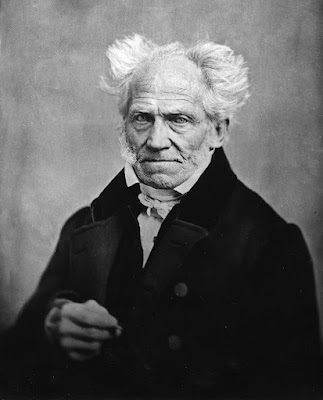“To desire immortality is to desire the eternal perpetuation of a great mistake.”
– Arthur Schopenhauer
Arthur Schopenhauer is known as a pessimist, but that is a great understatement. He had a very dark way of seeing the world. For example, he once said that “To desire immortality is to desire the eternal perpetuation of a great mistake.”
Specifically, Schopenhauer advocated the philosophical position of nihilism. Wikipedia defines nihilism as “a philosophy, or family of views within philosophy, that rejects general or fundamental aspects of human existence, such as objective truth, knowledge, morality, values or meaning.” (Source: Page on “Nihilism”) Quoting further from this page, “Different nihilist positions hold variously that human values are baseless, that life is meaningless, that knowledge is impossible, or that some set of entities do not exist or are meaningless or pointless.” (Source: Page on “Nihilism”)
Arthur Schopenhauer
More specifically, Schopenhauer’s philosophy is sometimes referred to as “existential nihilism.” Quoting again from Wikipedia, this is defined as “the philosophical theory that life has no intrinsic meaning or value.” (Source: Page on “Existential nihilism”) This philosophy also suggests that with respect to the universe, “a single human or even the entire human species is insignificant, without purpose and unlikely to change in the totality of existence.” (Source: Page on “Existential nihilism”)
Arthur Schopenhauer
Why would Schopenhauer have held such a dark view of life and the universe? Part of the answer lies in his life story. This is one area where this audiobook is extremely helpful. They take time to give a biography of him, showing (among other things) that he struggled with depression. They also give some evidence suggesting that depression probably ran in the paternal side of Schopenhauer’s family. For example, there’s an air of mystery surrounding his father’s death. Officially, the cause of death was that his father drowned in a canal near their home in Hamburg. But Schopenhauer and his mother both believed that his drowning death was a suicide, and so did many others. This must have affected the young Schopenhauer’s view of the universe. To him, life seemed at times to be not worth living – a view that seems common to people who are in the midst of a serious depressive episode.
Arthur Schopenhauer
I have struggled with depression myself. Thus, I am particularly sympathetic to Schopenhauer’s struggles here. I postulate that this was caused by a chemical imbalance in Schopenhauer’s brain, which he inherited from his father’s side of the family. This contributed to both his melancholy and his extreme pessimism. Some have wondered why Schopenhauer did not commit suicide, when he held such a dark view of life. It’s fair to say that his views were inconsistent with living a 72-year life, but it was obviously best that he decided to continue with life – rather than give up on it, as his father may have done. Indeed, one wishes that the younger Schopenhauer had held other views, that might have given him greater meaning and reason to live. (Although he obviously found some, if he lived a 72-year life.)
Arthur Schopenhauer
Of course, they go into his philosophy as well, and do not just explore his fascinating life story. For example, they go into the influence of Eastern religions (particularly Buddhism) on his philosophy, and also explore Schopenhauer’s fascination with art – which, incidentally, helped him to battle his depression somewhat. They explore his nihilism in some detail, and how it overlapped with the “problem of evil” views that are so common to atheists like Schopenhauer. In effect, such beliefs ask why a benevolent God would allow his children to suffer as Schopenhauer did (and others still do). Time does not permit me to answer such concerns in detail in this post, but I will refer readers to another website if they would like to see these concerns addressed. (Here if you’re interested.) Suffice it to say for our purposes here that life has much to offer us, and that finding meaning in it is conducive to one’s mental health. I believe that a God-fearing religion can be particularly helpful in finding meaning in life, although I acknowledge that there are many atheists who succeed in doing so – at least, when they do not embrace nihilism as Schopenhauer did.
Arthur Schopenhauer
I don’t want this blog post to get much longer than it already is, so suffice it to say that this was a great introduction to Schopenhauer’s philosophy. I still don’t agree with much of what Schopenhauer had to say, but started to understand better why he felt that way, and how much clinical depression had to do with his views. In particular, their biography of Schopenhauer is among the most eye-opening that I’ve heard, although they do a great job of examining his philosophy as well, which is the main focus of this audiobook (and thankfully so).
Footnote to this blog post:
A future leader of my church once quoted the passage from Schopenhauer that I began this post with. (Or, more precisely, he quoted it twice.) However, he quoted it somewhat disapprovingly. Again, the passage in question says that “To desire immortality is to desire the eternal perpetuation of a great mistake.” (Quoted in 1976, and again in 2007.)
See also:
Part of an audiobook series
The Giants of Philosophy
Arthur Schopenhauer
See also the audiobook series
The World of Philosophy
Avicenna and Medieval Muslim Philosophy
Others to be covered later









No comments:
Post a Comment